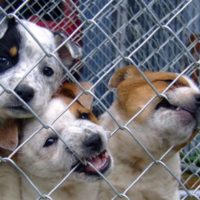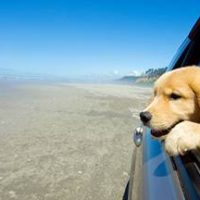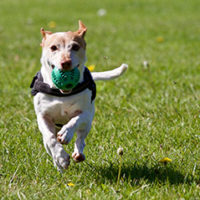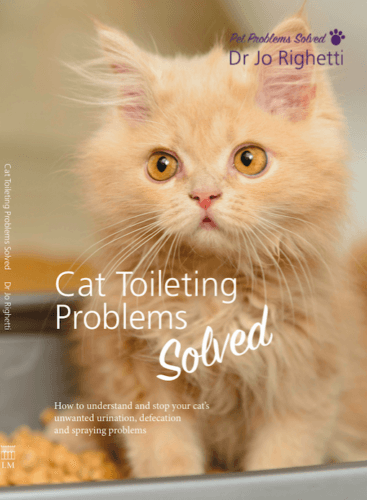Dog Toileting Behaviour & House Training Issues Solved
Dog Toileting Problems and their Solutions: Summary
- Dog toileting is a normal behaviour but inappropriate urination or defecation around the home cause problems.
- Management of dog toileting is important. Block off areas of your home and have a vet check.
- Long term solutions involve training your dog to toilet in the correct place, while addressing any behavioural needs such as anxiety reduction.
From the occasional ‘accident’ to the habitual indoor leg lifter, dog toileting behaviour troubles and house training issues can be frustrating for many owners. These dog toileting tips will help…
Why dog toileting can be a problem
1. Age and stage
Puppies often take months to learn to hang on overnight. Provide an appropriate spot for them to toilet. Usually putting newspapers down near the doorway works well.
Senior dogs may become incontinent. Try some pee pads over on under their bedding and be sure to take them out for regular toilet breaks, making sure they can handle steps.
2. Accidents happen
Most adult dogs will have an occasional lapse in cleanliness, perhaps when they are caught short, their exit is blocked or it is raining outside. Most dogs do not like doing this but have no choice.
3. Medical issues
Inappropriate toileting can be a symptom of a medical condition so it is important if your dog has changed their behaviour that have them checked out by your vet.
Vet check
Check with your vet prior to starting any behavioural therapy. You may need to collect a sample of urine for your vet to analyse. Blood test may also be necessary in some cases.
Anxiety can cause toileting behaviour problems
Your dog’s unwanted toileting habits may be a symptom of anxiety, especially separation anxiety, where your dog frets when left alone. Follow the tips given in Dog Anxiety.
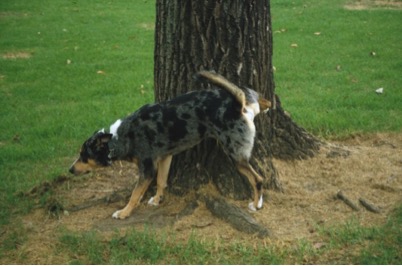
Management of the dog toileting issue
The best form of management for the canine house training problem is to keep your dog out of areas that their urination or defection is unwanted. Close doors in your home and block off areas of your yard that are off-limits.
Take your dog outdoors to their or your preferred toileting spot. Go with them and praise them when they toilet. even put this behaviour on command, saying “Toilet” as they urinate or defecate.
You will need to clean soiled areas of your home. Yes, you can clean with human detergents but you also need to apply an enzymatic cleaner to the area.
Read more about cleaning dog toileting spots.
Solutions for the house training problem
Back to basics
If your dog has never learnt to toilet properly or if they appear to have forgotten how to pee or poo outdoors, remind them. It may feel like starting all over again but this is worth it, in the long term.
As above, take them outside to the preferred toilet spot after every sleep, rest, meal, play session or every 30 minutes. If they toilet praise. If they don’t, take them out again in 30 minutes.
Every bit of time you spend toilet training your puppy or dog will help prevent or manage the dog toileting or house training problem.
Encourage through scent
If your dog toilets in an area of your garden which you find inappropriate – a deck or balcony or your children’s play areas for instance – you may be able to encourage them to go in your chosen spot by taking a little of their faeces to the desired spot. Accompany your dog to the area and praise them when they toilet there.
Create a living area
If there are particular spots within your home that your dog favours to toilet, put some food in those spots and get down on the floor and play or pat your dog there. If your dog views this area as a living spot, they are less likely to soil there.
Remember, however, that they will now be looking for a different spot to toilet. Make sure they choose an appropriate one.
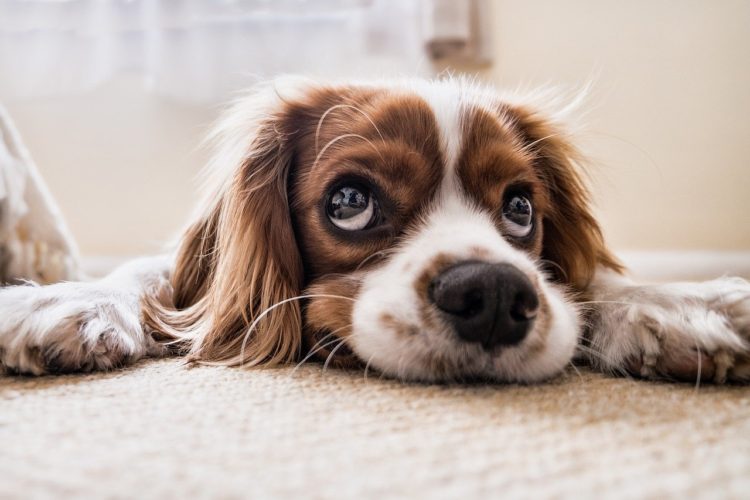
Other dog toileting behaviour issues: Eating Poo
Eating faeces (poo) may indicate a medical condition so a vet check is required. Often it occurs with puppies who are overly enthusiastic at eating everything they come across. An impoverished environment or an inability to move away to toilet can also result in a dog eating poo. More about inappropriate eating habits at Pet Eating Problems.
When dog toileting behaviour does not improve
Animal behaviourist, Dr Jo Righetti , has a method which never fails. It is not the preferred method for most dog owners but it works!
Tie your dog to you by lead or string. Everywhere you go, your dog goes too. In this way, you will be aware of when your dog needs to toilet and take them out immediately.
Signs of needing to toilet include sniffing, circling or heading out of a living area. Try this method if all else has failed.
Frequently asked questions about dog toilet behaviour
Why does my dog pee inside
The most likely explanation for this is that your dog has separation anxiety. Do check that your dog is able and willing to get outdoors to toilet or has a suitable place inside.
it could also be that something has spooked your dog outside. Go out with your dog when you wish them to toilet.
Why does my dog poop on the concrete?
Some dogs pick a particular substrate e.g. grass or concrete to toilet on. Take your dog to your desired toileting spot and praise them when they go.
Why does my dog follow me to the toilet?
Dogs love to follow us lots of places. Read more here.
Related dog articles
Can pets and a clean home ever go together?
Dog owner guide for a clean and odour-free home
Natural cleaning tips for pets
Pets in your toilet
More dog articles
- Predicting the behaviour of rescue dogs. New Research to Improve Adoptability
 Predicting the behaviour of rescue dogs : It’s difficult to compare a shelter to a sofa! Are you thinking about adopting a rescue
Predicting the behaviour of rescue dogs : It’s difficult to compare a shelter to a sofa! Are you thinking about adopting a rescue - Does The Anxiety Wrap work?
 Does the Anxiety Wrap Work? Does your dog suffer from anxieties, fears or phobias? Stress is common in our pet dogs and most
Does the Anxiety Wrap Work? Does your dog suffer from anxieties, fears or phobias? Stress is common in our pet dogs and most - Top 10 Problem Pets – and Problem Pet Behaviour
 Are you frustrated, angry or puzzled y your pet’s behaviour? Here’s your guide to the top 10 problem pets and problem cat behaviour and dog behaviour…
Are you frustrated, angry or puzzled y your pet’s behaviour? Here’s your guide to the top 10 problem pets and problem cat behaviour and dog behaviour… - Road tripping with a dog with car anxiety
 If your dog is anxious while you travel, these tips, from Sarah Archer at Your Best Digs, may help… Road tripping with a
If your dog is anxious while you travel, these tips, from Sarah Archer at Your Best Digs, may help… Road tripping with a - A Day In The Life of A Pet Care Centre
 Do you ever wish that your dog was better behaved or perhaps just had more activities to occupy them? A pet care centre
Do you ever wish that your dog was better behaved or perhaps just had more activities to occupy them? A pet care centre - The Lazy Guide to Dog Training
 The Lazy Guide to Dog training by animal behaviourist (and lazy dog trainer!) Dr Jo Righetti… This blog post is part of the
The Lazy Guide to Dog training by animal behaviourist (and lazy dog trainer!) Dr Jo Righetti… This blog post is part of the
Dog habits explained
Does your dog display quirky or funny dog habits? Every dog can have their own quirk, it might be the way they great you when you get home… Read more
About the owner of Pet Problems Solved: Dr Jo Righetti
Dr Jo Righetti is an animal behaviourist, helping people with pets. With a PhD in behaviour, a diploma in counselling and over 20 years experience in business Pet Problems Solved, Dr Jo understand pets and communicates here knowledge in a motivational manner.
